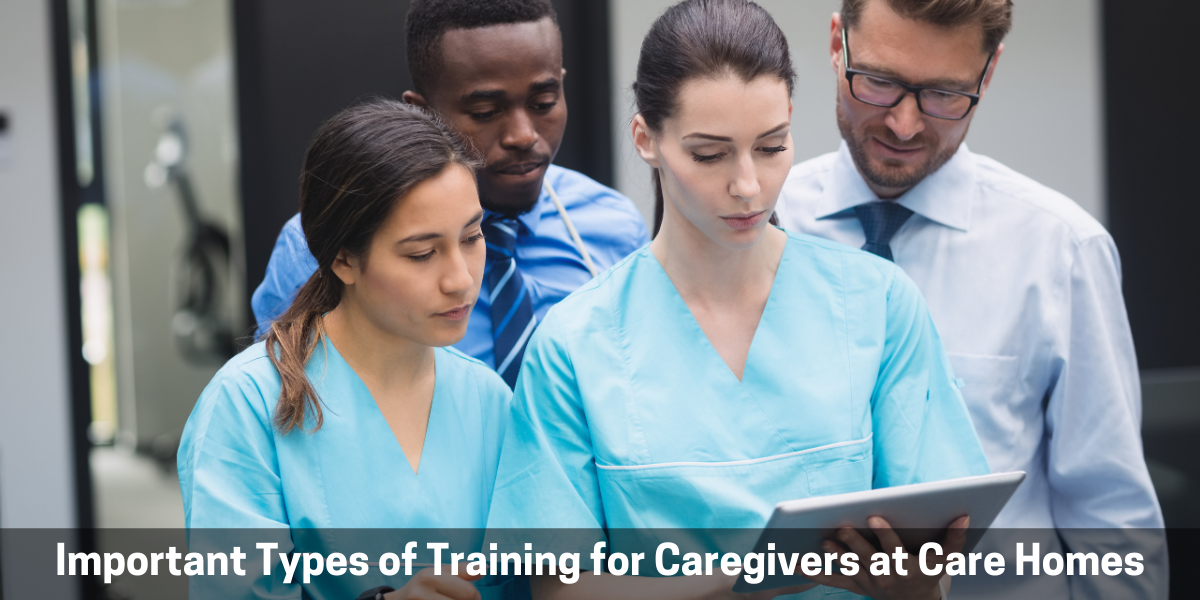From administering medicines to meal planning and providing emotional support to residents – caregiving is a complex job that requires a wide range of skills. Right training programs can help caregivers improve their knowledge and skills, which can lead to an improved understanding of residents’ needs. Attending different types of training can help caregivers offer better care for residents and it can also help them enhance their caregiving career. If you are a care home manager and looking for information on important types of training for caregivers at care homes, here is a useful read:
Types of training for caregivers
1. Medication administration training:
Medication administration is an incredibly important part of providing quality care for patients in all healthcare settings. To ensure medication safety at care homes, it is important that caregivers be properly trained on the important aspects such as:
- Different types of medications and their side effects
- Dosage calculation
- Understanding of different routes such as oral and topical
- Proper storage of medications
- Proper handling of medication
- Medication documentation such as mar chart and medication or eMAR chart training
Switch to eMAR chart for better care
Medication errors in care homes can be detrimental to the health and lives of residents, so taking preventive steps is essential. One way to minimise medication errors is by using the eMAR chart medication software system. From hassle-free medication documentation to streamlined medication administration processes, eMAR can help your care home in many ways.
2. Dementia care training:
It is important that caregivers receive adequate training on how to support residents with dementia. Such training should cover important aspects such as
- Understanding different types of dementia
- How to recognise different signs and symptoms
- Strategies to deal with challenging behaviour
3. Emergency response training:
It is important for caregivers to have the right knowledge and skills to recognise and respond to emergency situations. Here are some key areas of training that caregivers should focus on:
- The basics of first aid
- The basic fire safety preparedness such as how to evacuate the building and how to find the emergency supplies
- Dealing with medication errors
Such training should be routinely reviewed to ensure that caregivers are prepared to respond in a calm manner in emergency scenarios.
4. Infection control training:
Infection control is an essential part of practising safe and effective health care. Without the proper knowledge, caregivers may be prone to making mistakes that could lead to infection outbreaks or the spread of disease. That is why frequent training on infection control practices should be provided to all caregivers so they understand the importance of hand hygiene and the appropriate use of PPE.
5. Person-centred care training:
Person-centred training can enhance the quality of life for residents in care homes. By taking into account individual preferences and needs, caregivers are able to provide tailored care that is appropriate for each resident. Training helps to ensure that all the caregivers are up-to-date on the best practices for person-centred care.
7. Safeguarding training:
Safeguarding training is essential in any care setting. Caregivers must be educated on how to identify and report any signs of abuse or neglect they observe. This training should also empower caregivers to take the appropriate steps to protect residents from harm. Also, as a care home manager, you must ensure that caregivers know that proper channels are in place when suspected abuse is reported.
8. Food safety training:
Food safety training is an important factor to ensure that residents receive safe and nutritious meals. It is essential that caregivers have the knowledge and skills to reduce the risks associated with food poisoning.
9. End-of-life care training:
Providing quality end-of-life care to residents is essential in any residential setting. To ensure that caregivers are well equipped to provide effective support, they should receive specialised training on the subject. Topics that need to be covered include symptom management, pain relief, and providing emotional support to the residents and their families. It is important that caregivers understand how to handle these issues with sensitivity and compassion.







